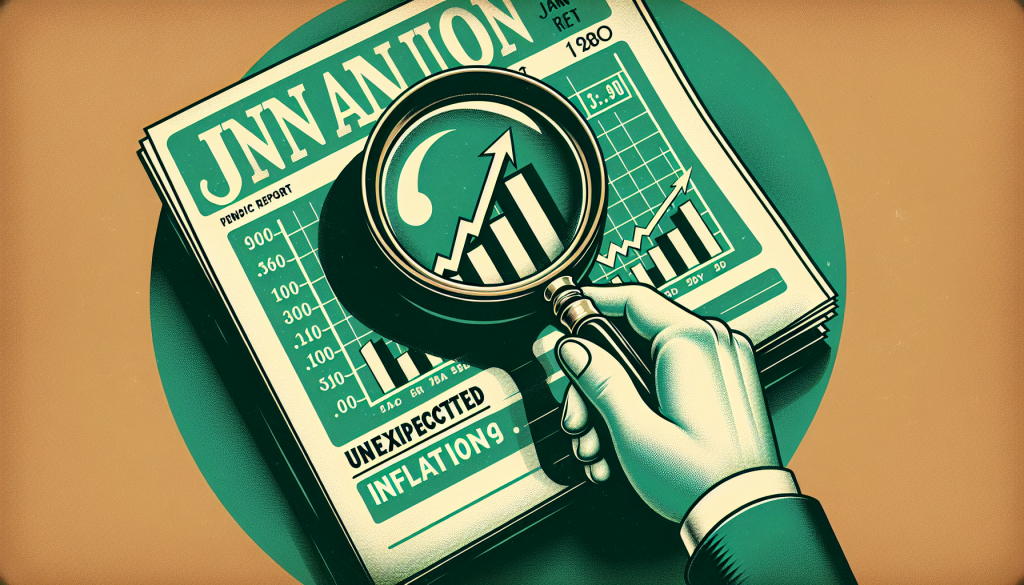Decoding January’s Unexpected Inflation Report

The financial world was rocked by the release of the January inflation report, which revealed a higher-than-anticipated inflation rate. The market had been bracing for an inflation rate of 2.9%, a significant psychological threshold that would have marked the first time the inflation rate dipped below 3% since the inflation surge in 2021. However, the report showed a higher figure of 3.1%, indicating that inflation is not decreasing as previously hoped.
Impact on the Stock Market
The higher-than-expected inflation rate has had a significant impact on the stock market. Stocks have taken a hit, with many experiencing a sharp drop in value. This is primarily because the higher inflation rate means the Federal Reserve (Fed) cannot cut interest rates.
For the past six months, the market has been operating under the assumption that the Fed would be able to implement numerous rate cuts. This belief was based on the expectation that inflation would continue to fall, allowing for more flexibility in monetary policy. However, the January inflation report has shattered this assumption.
Within just 15 minutes of the inflation report’s release, the market’s expectations shifted dramatically. The market had been pricing in five interest rate cuts for 2024. However, this expectation dropped to just four rate cuts following the report.
Market Reactions and Future Implications
The question now is whether this is a temporary market reaction or a sign of more significant economic shifts. Is the market merely taking a breather for the day, or is inflation actually starting to rise again? If the latter is true, it could be the catalyst for a more pronounced drawdown in a market that is already considered expensive.
The potential for rising inflation is a concern for investors and economists alike. Inflation erodes the purchasing power of money, meaning that consumers can buy less with the same amount of money. This can lead to decreased consumer spending, which can slow economic growth.
Moreover, inflation can also impact the cost of borrowing. When inflation is high, interest rates often rise to keep inflation in check. This can make borrowing more expensive for businesses and consumers, further slowing economic growth.
Conclusion
The January inflation report has certainly given investors and economists much to consider. The higher-than-expected inflation rate has already had a significant impact on the stock market, and it could potentially have broader economic implications.
As we move forward, it will be crucial to monitor inflation trends closely. Whether this report is a one-off or a sign of a broader trend toward higher inflation will have significant implications for monetary policy and the economy’s overall health.
As always, investors need to stay informed and make decisions based on the most up-to-date information. Following daily financial updates can provide valuable insights into the ever-changing economic landscape.
Frequently Asked Questions
Q. What was the anticipated inflation rate for January?
The market had been bracing for an inflation rate of 2.9%.
Q. What was the actual inflation rate reported for January?
The January inflation report showed a higher figure of 3.1%.
Q. How did the higher-than-expected inflation rate impact the stock market?
The higher-than-expected inflation rate has significantly impacted the stock market, with many stocks experiencing a sharp drop in value.
Q. Why did the market’s expectations for interest rate cuts change after the release of the inflation report?
The market had been pricing in five interest rate cuts for 2024. However, this expectation dropped to just four rate cuts following the report.
Q. What are the potential implications of rising inflation?
Rising inflation can erode the purchasing power of money, lead to decreased consumer spending, slow economic growth, and make borrowing more expensive for businesses and consumers.
Q. What is the importance of monitoring inflation trends?
Monitoring inflation trends is crucial as it can have significant implications for monetary policy and the economy’s overall health.
Q. What is the advice for investors in light of the January inflation report?
Investors need to stay informed and make decisions based on the most up-to-date information. Following daily financial updates can provide valuable insights into the ever-changing economic landscape.
The post Decoding January’s Unexpected Inflation Report appeared first on Due.


